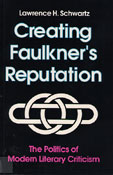Creating Faulkner's Reputation
The Politics of Modern Literary Criticism

- Author(s): Schwartz, Lawrence H.
- Series:
- Imprint: Univ Tennessee Press
- Publication Date: 1990-02-08
- Status: Active
- Available in Paper: Price $28.00 | Buy Now
Creating Faulkner’s Reputation
The Politics of Modern Literary Criticism
Lawrence H. Schwartz
In a striking portrayal of the political underside of modern literary criticism, Lawrence Schwartz argues that Faulkner’s public stature is a cultural artifact created within a specific historical-political milieu.
Schwartz asks: How was it possible for a writer, out-of-print and generally ignored in the early 1940s, to be proclaimed a literary genius in 1950?
” . . . an exceptionally important contribution to intellectual history. His thesis, that Faulkner’s public stature is a cultural artifact created within a specific historical-political milieu, and that it was in part the product of conscious ideological intentions, is abundantly supported by analysis and research into both archival and printed sources. The book elucidates not only the particular phenomenon of Faulkner’s cultural stature but also many aspects of American cultural history since World War II. It should force discussion of questions that too often get swept under the rug.”
–H. Bruce Franklin, Rutgers
“Schwartz makes an exceptionally important contribution to intellectual history. “–
H. Bruce Franklin, Rutgers
“The book elucidates not only the particular phenomenon of Faulkner’s cultural stature but also many aspects of American cultural history since World War II. It should force discussion of questions that too often get swept under the rug.”
–H. Bruce Franklin, Rutgers
“Schwartz makes an exceptionally important contribution to intellectual history. His thesis, that Faulkner’s public stature is a cultural artifact created within a specific historical-political milieu, and that it was in part the product of conscious ideological intentions, is abundantly supported by analysis and research into both archival and printed sources.”
–H. Bruce Franklin, Rutgers.
“The social reality of literary canon-making, rather than the romantic mythology of misunderstood and unappreciated genius, is the subject of this important study of the shift in William Faulkner’s reputation as a writer in the post World War II period.”
–Alvin Kernan, Princeton University.
“Schwartz’s clear grasp of the fact that the literary canon is established not by pure art but by a complex interaction of social forces is impressive.”
–Alvin Kernan, Princeton University
“Schwartz’s clear grasp of the fact that the literary canon is established not by pure art but by a complex interaction of social forces is impressive. This view is expressed with great power and demonstrated with the kind of detailed examination of the documents needed to establish the solid facts.”
–Alvin Kernan, Princeton University
“Not only is the particular case examined a critical one for American letters, but the book exemplifies a method for the social criticism of literature of the newer variety.”
–Alvin Kernan, Princeton University
“The social reality of literary canon-making, rather than the romantic mythology of misunderstood and unappreciated genius, is the subject of this important study of the shift in William Faulkner’s reputation as a writer in the post World War II period. Schwartz has given us a detailed and convincing study of the ways in which politics, economics, education, publishing, literary theory and the varieties of human nature combined to raise Faulkner from near oblivion to the status of the great American writer of the 20th century. Schwartz’s clear grasp of the fact that the literary canon is established not by pure art but by a complex interaction of social forces is impressive. This view is expressed with great power and demonstrated with the kind of detailed examination of the documents needed to establish the solid facts. Not only is the particular case examined a critical one for American letters, but the book exemplifies a method for the social criticism of literature of the newer variety.”
–Alvin Kernan, Princeton University
“Fair and scrupulous though sometimes repetitive, Schwartz’s book is an intellectual thriller: mysterious, inquisitive, and in the end almost totally convincing.”
—Kirkus Reviews
“Schwartz’s study is primarily directed toward elucidating the historical process by which Faulkner became great, and in this task it succeeds admirably. With the publication of Creating Faulkner’s Reputation scholars uncritically assuming Faulkner’s genius will have to query and historicize their criteria for evaluation. This book has changed the landscape of Faulkner scholarship and is indispensable to an understanding of Faulkner’s place in literary history.”
—Barbara Foley, Novel
“Lawrence H. Schwartz believes that canons are not made by greatness alone, for many are great but few are chosen: canons are made by shifts in historical conditions. . . . Schwartz tells his story with clarity. . . . This is, then, a refreshing book, free of mysticism. It may have influence if others follow Schwartz’s lead in skepticism.”
—Michael O’Brien, American Historical Review
“Schwartz has written an invaluable case study of Faulkner’s dramatic rise to fame that should provide a model for future investigations into the material basis of literary reputations.”
—Joseph R. Urgo, South Atlantic Review
